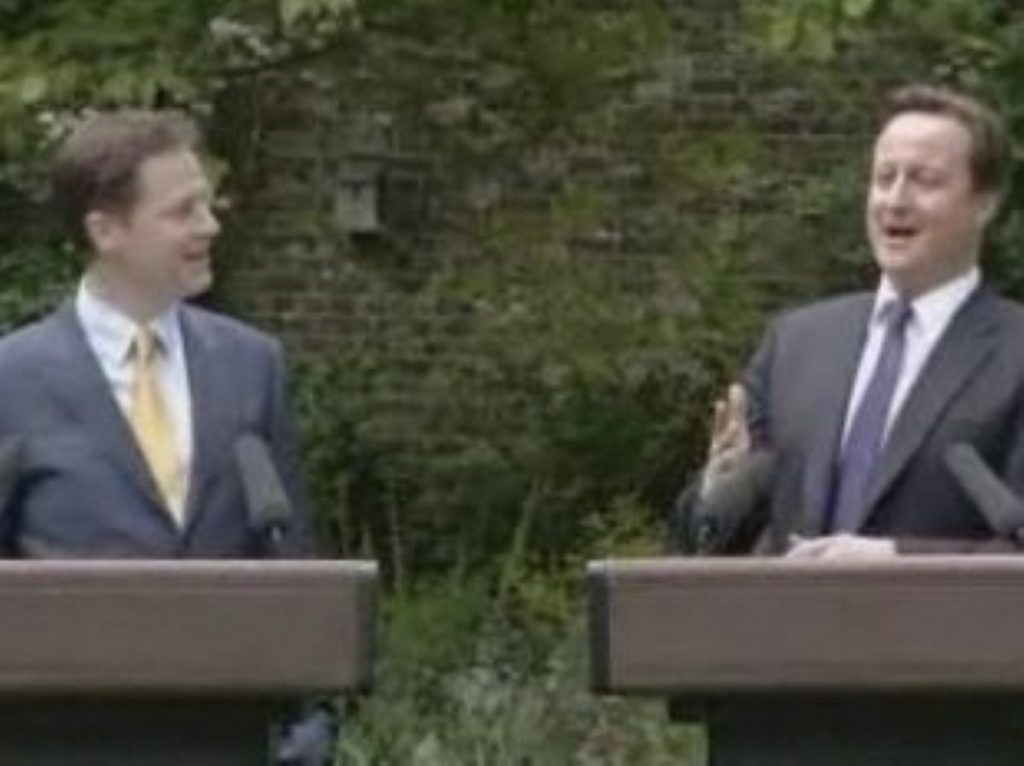Lib-Con: Reactions
The new government coalition has caused hope and disappointment in interested groups.
By Marina Kim and Aled Thomas
The deal between David Cameron and Nick Clegg to form a coalition government has seen some significant compromises on both parties’ policies. Here’s some initial reactions from outside the Westminster bubble.
One of the most obvious sticking points is electoral reform which seemed only to be resolved when The Tories offered the Lib Dems a referendum on alternative vote (AV).


On Saturday Nick Clegg broke off party talks to address a protest organised by Power 2010.
A spokeswoman for the pressure group said it was “disappointed” by the deal: “We were campaigning for proportional representation that links the number of votes to the number of seats,” she said.
“It’s a start in the right direction, but it is not enough. We would have wanted more,” she said, promising to “continue campaigning.”
That view was echoed by the Electoral Reform Society. Spokesman Ken Ritchie said: “We are very disappointed; a big opportunity has been missed to change fundamentally politics.
“The Conservatives have said they’ve wanted a change throughout the campaign, but when it comes to changing politics they are against it.
“It’s disappointing the alternative deal offered by the Labour party didn’t work. it failed because Labour feared they couldn’t deliver it in their own party, because there are figures like John Reid who would simply not accept there needs to be a change in the political system.
“We must make sure it’s not just David Cameron saying we can have a referendum and mobilising all the resources of Ashcroft and his media to campaign for a no vote.
“It’s a more difficult referendum, if we’d had one on STV we could have campaigned on the possibility of not just tinkering round the edges but on making a real change to the system.”
The leadership debates also emphasised a major difference between Mr Cameron and Mr Clegg on defence. The Lib Dems promised to review a replacement for Trident while the Tories pledged a like-for like replacement.
The chairwoman for Campaign for Nuclear Disarmament (CND) Kate Hudson said: “During the election campaign Nick Clegg rightly demanded that Trident should be included in the forthcoming Strategic Defence Review.
“It is to be hoped that he has not renounced this basic common sense demand – so central to the Lib Dems’ principles – in order to join the Conservatives in government.
“When considering drastic cuts to public spending, Trident must not be exempt.”
The first job the new government has given itself is to address public spending and the deficit. Again there were policy differences; David Cameron’s promised £6 billion in savings this year were criticised by Vince Cable
Public sector union Unison chief Dave Prentis hit back at any possible plan to make such cuts, calling it a “giant leap backwards”.
He said: “Those voters who put their cross down for change have been sorely deceived. In a giant leap backwards, the Liberal Democrats have ditched their promise to oppose the Tories’ savage £6 billion spending cuts.
“This will have a devastating effect on local services, our NHS and our schools. It will put the recovery at risk and cost thousands of jobs.
“Vital services that we all rely on and public sector workers should not be sacrificed to some sorry game of political chess.
“Unison will fight to protect valued public services and jobs. With unemployment going up to 2.5m today, it makes no sense to add public sector workers to the dole queues.”
Cuts in spending, and taxes, could be expected to appeal to the Taxpayers’ Alliance.
Its chief executive Matthew Elliott said: “The set of tax policies so far announced is a mixed bag. Raising the income tax threshold to £10,000 is a fantastic decision and will deliver economic and social benefits that will change many lives for the better.
“However, it will disappoint millions of people that the Conservatives are effectively abandoning their pledges to raise the inheritance tax threshold and cancel the increase in employees’ national insurance.
“There is no reason why a coalition government should lack ambition, and we will be working hard to ensure that the Emergency Budget contains a lot more spending cuts than have so far been announced.”
The work of George Osborne and David Gray in the Treasury to cut back on the deficit will be welcomed by the Confederation of British Industry.
Richard Lambert, the business organisation’s director-general, said:
“The agreement between the Conservative and Liberal Democrats to form the next government is welcome news. Business wants to see a stable government with the authority to take the tough decisions that will be required to keep the economic recovery on track and to get a grip on the fiscal deficit. This coalition should have the votes and the mandate to get on with the job.
“In the past few days, leaders of all three of the main political parties have emphasised their commitment to restoring fiscal stability in the national interest. That must be their overriding priority in the months to come.”
Immigration has long been a Tory touchstone issue, with David Cameron promising a cap on immigration and attacking the Lib Dem’s ‘amnesty plans.
Habib Rahman, chief executive of the Joint Council for the Welfare of Immigrants, said he hoped that the coalition meant the smaller party’s influence would moderate the Conservatives’ stance.
He said: “We liked a lot of what the Lib Dems said about the regularising of many immigrants and getting them to pay their dues. We hope they will be able to moderate the Conservatives, and hope we will have an avenue to talk to the government through the Lib Dems.”









